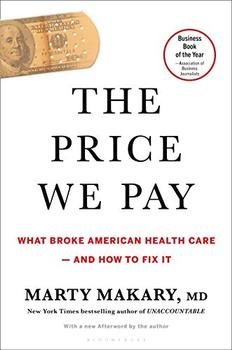Summary | Excerpt | Reviews | Beyond the Book | Readalikes | Genres & Themes | Author Bio

What Broke American Health Care--and How to Fix It
by Marty Makary
The overuse of medical services represents one of the greatest public health issues of the modern world. We don't often think of the appropriateness issue in health care the way we think of Ebola or Zika. Yet new research, and my own personal conversations with many physicians overseas, seems to indicate that more people are harmed from unnecessary care or poor-quality care than from Ebola and Zika combined. In 2017, the Lancet produced a special issue on overuse called "Right Care." It defined overuse as "the provision of medical services that are more likely to cause harm than good."
There's a continuum of overuse. At one end are tests and treatments that are beneficial when used on the right patient. At the other end of the continuum are services that are entirely futile or even so risky they should never be delivered. Some examples of overtreatment around the world cited in the Lancet series were unnecessary procedures performed at a rate of 26 percent of knee replacements in Spain, 49 percent of upper endoscopies in Switzerland, 55 percent of cardiac interventions and one third of hysterectomies performed in women younger than 35 performed in India, and 20 percent of hysterectomies performed in Taiwan. Fifty-five percent of Thai children with acute diarrhea inappropriately received antibiotics.
On medical travels throughout the world, I've asked physicians to tell me about the burden of unnecessary medical care. They don't hold back. A general surgeon from Sudan told me of a patient who was told by another surgeon that she needed a mastectomy of both her breasts for a small lump in one breast that was never biopsied. Not only that, the woman was told she needed to have the surgery within 24 hours to prevent the cancer from spreading. Of course, the recommendation was bogus, and the tight time frame was nothing more than a technique to manipulate patients into having surgery and not getting another opinion so the surgeon doesn't lose business.
A pediatrician in North Africa told me a child was taken for heart surgery and only had the skin cut open, then immediately sewn shut at the time of surgery. The parents were told by the surgeon that a heart operation had been performed. Another surgeon told me of a doctor who, while doing a colon operation, removed a kidney to transplant into another patient without asking the patient. The scandal of inappropriate medical care can sometimes be criminal.
One of the surgeons I became fond of in Egypt, Dr. Sami, demonstrated to me how he takes the surgical specimen out to the waiting room and shows it to the family. I couldn't believe what he was doing. My patients back home would probably vomit and give me one star in all the online reviews. In the Middle East, he explained, some families ask to see the specimen with their own eyes to be sure that the operation was actually performed.
Adam Elshaug, professor of health policy at the University of Sydney in Australia, was a contributor to the Lancet special issue on overuse. When he was asked in a Q&A with the Commonwealth Fund whether the problem of overuse is as bad as we've been led to believe, he said, "It might be worse. Evidence suggests that the world's various health care systems are becoming even less efficient. We're moving in the wrong direction."
From The Price We Pay by Marty Makary. Used with the permission of the publisher, Bloomsbury. Copyright © 2019 by Marty Makary.






Your guide toexceptional books
BookBrowse seeks out and recommends the best in contemporary fiction and nonfiction—books that not only engage and entertain but also deepen our understanding of ourselves and the world around us.